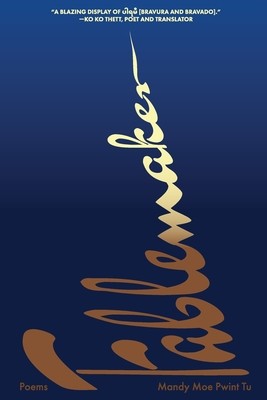
- We will send in 10–14 business days.
- Author: Mandy Moe Pwint Tu
- Publisher: Gaudy Boy, LLC
- ISBN-10: 1958652180
- ISBN-13: 9781958652183
- Format: 15.2 x 22.9 x 0.7 cm, mīksti vāki
- Language: English
- SAVE -10% with code: EXTRA
Reviews
Description
"A blazing display of bravura and bravado . . . each of [Tu's] utterances [is] a lesson in runic risk." -ko ko thett, poet and translator
Selected by Ng Yi-Sheng as the winner of the 2024 Gaudy Boy Poetry Book Prize.
Born out of a myriad of griefs in the wake of Myanmar's violent return to military rule, Fablemaker alchemizes the pains of a fractured life into heart song.
On February 1, 2021, Myanmar's military staged a coup d'etat, imprisoning the country's democratically elected leaders and declaring a state of emergency. In response, the people of Myanmar sustained ongoing protest acts in full defiance the military. Mandy Moe Pwint Tu's debut, Fablemaker, written during the Spring Revolution, weaves together a troubled familial history and a national reckoning.
The collection follows the speaker as she contends with her father's untimely death, her country's crisis, and her de facto exile to the United States. Wrought with tenderness, the poems bear witness to loss, rage, grief, and love-and the fables she created to survive it all. Through Burmese folklore, formal invention, and addresses to a "dear fellow fablemaker," Tu strives to imagine a self and a world that, after their devastation, recover.
- Author: Mandy Moe Pwint Tu
- Publisher: Gaudy Boy, LLC
- ISBN-10: 1958652180
- ISBN-13: 9781958652183
- Format: 15.2 x 22.9 x 0.7 cm, mīksti vāki
- Language: English English
"A blazing display of bravura and bravado . . . each of [Tu's] utterances [is] a lesson in runic risk." -ko ko thett, poet and translator
Selected by Ng Yi-Sheng as the winner of the 2024 Gaudy Boy Poetry Book Prize.
Born out of a myriad of griefs in the wake of Myanmar's violent return to military rule, Fablemaker alchemizes the pains of a fractured life into heart song.
On February 1, 2021, Myanmar's military staged a coup d'etat, imprisoning the country's democratically elected leaders and declaring a state of emergency. In response, the people of Myanmar sustained ongoing protest acts in full defiance the military. Mandy Moe Pwint Tu's debut, Fablemaker, written during the Spring Revolution, weaves together a troubled familial history and a national reckoning.
The collection follows the speaker as she contends with her father's untimely death, her country's crisis, and her de facto exile to the United States. Wrought with tenderness, the poems bear witness to loss, rage, grief, and love-and the fables she created to survive it all. Through Burmese folklore, formal invention, and addresses to a "dear fellow fablemaker," Tu strives to imagine a self and a world that, after their devastation, recover.


Reviews